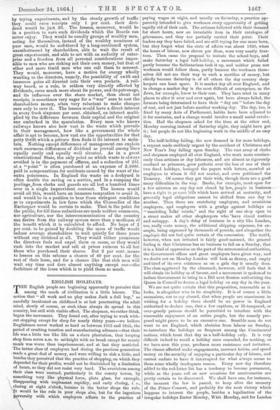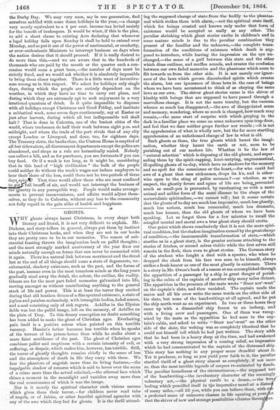ENGLISH HOLIDAYS.
THE English people are beginning apparently to perceive that among the needs of civilization is a little leisure. The notion that" all work and no ploy makes Jack a dull boy," so carefully inculcated on childhood is at last penetrating the adult mind, slowly of course, as such ideas always do spread in this country, but still with visible effect. The shopmen, we rather think, began the movement. They found out, after trying to work with- out stopping except for sleep for nearly thirty years—we believe Englishmen never worked so hard as between 1815 and 1845, the period of crushing taxation and manufacturing advance—that their life was a little too like life on a slave plantation, that keeping shop from seven a.m. to midnight with no break except for scanty meals was worse than imprisonment, and at last they mutinied. The better class bf employers had during the previous generation -made a great deal of money, and were willing to risk a little, and besides they perceived that the practice of shopping, on which they depended for their profits, would not be diminished by a limitation of hours, so they did not resist very hard. The avaricious among their class were coerced, particularly in the county towns, by something very like physical force, plate glass, for example, disappearing with unpleasant rapidity, and early closing, i. e., closing at eight o'clock, became in the better shops the rule. 4 would be the rule in poor shops also, but for the ingenious
rversity with which employers adhere to the practice of
paying wages at night, and usually on Saturday, a practice ap- parently intended to give workmen every opportunity of getting
rapidly rid of their cash. The artisans followed with their demand for short hours, now an invariable item in their catalogue of grievances, and they too partially carried their point. Their leaders say they have failed, and are still trying for one more hour., but they forget what the state of affairs was about 1820, when the hours of labour, now eleven per diem, were very nearly four- teen. Then came the proposal to imitate the school-boys, and make Saturday a legal half-holiday, a movement which failed partly because the Sabbatarians took it up, and neither press nor workmen would follow them, partly because the workmen them- selves did not see their way to such a sacrifice of money, but chiefly because Saturday is of all others the day country shop- keepers can least spare. It is market day all over England, and to change a market day is the most difficult of enterprises, as the
Jews, for example, know to their cost. They have tried in many places to alter it over and over again, but have always failed, the farmers being determined to have their "day out" before the day of rest, and not just before another working day. The day, too, is fixed by many Acts of Parliament, habits have been adjusted to it for centuries, and a change would involve a small social revolu- tion. Had the shopmen asked for the time at the other end, Monday morning instead of Saturday night, they might have got it; but people do not like beginning work in the middle of an easy day.
- The half-holiday failing, the new demand is for more holidays, a request made suddenly urgent by the accident of Christmas and New Year's Day falling upon Sunday. The vast army of clerks and shopmen employed all over England, who work more continu- ously than artizans or day labourers, and are almost as rigorously confined as prisoners, grew pathetic over the loss of one of their two fixed holidays, besieged the papers with letters, scowled at employers to whom it did not matter, and even petitioned the Treasury. Of course they got their wish, though there are a good many difficulties in the way. Banks, for example, must open for a few minutes on any day not closed by law, people in business have a right to prasent bills which have arrived at maturity, and generally legal obligations cannot be shifted from one day to another. Then there are crotchetty employers, and avaricious employers, and employers with a grudge against holidays as "unsettling Ifolks' minds," and the sight of one shop open in a street makes all other shopkeepers who have closed restless and unhappy. A day's delay of business in a city like London, too, really costs money, the additional shipping expenses, for ex- ample, being expressed by thousands of pounds, and altogether the employie did not feel quite certain of the concession. The world, however, when not irritated is fairly good-natured, the general feeling is that Christmas has no business to fall on a Sunday, that it is a kind of oppression on the part of the astronomical authorities, the Government offices and great employers have given way, and we doubt not on Monday London will look as dreary, and empty and tired of its own existence as on a gala day it usually does. The class aggrieved by the almanack, however, still feels that it will obtain its holiday as of favour, and a movement is spoken of to induce Government to bring in a Bill next Session authorizing the Queen in Council to decree a legal holiday on any day in the year.
We are not quite certain that this proposition, reasonable as it looks, is altogether wise in its simplicity. It is of course a little anomalous, not to say absurd, that when people are unanimous in wishing for a holiday there should be no power in England authorized to declare one, that a few captious, or ill-tempered, or over-greedy persons should be permitted to interfere with the reasonable enjoyment of an entire people, but the remedy pro- posed might prove to be an excessive one. Sensible men do not want to see England, which abstains from labour on Sunday, re-introduce the holidays so frequent among the Continental nations, which treat that day as a half-holiday only. It is very difficult indeed to recall a holiday once conceded, for nothing, as we have seen this year, produces more resistance and irritation. The classes affected make engagements, contract habits, and spend money on the security of enjoying a particular day of leisure, and cannot endure to have it interrupted for what always seems to them some wholly inadequate reason. Every new day therefore added to the red-letter list has a tendency to become permanent, while as the years roll on new occasions for anniversaries are pretty certain to be discovered. We shall have one, for instance, the moment the law is passed, to keep alive the memory of the Prince Consort, and probably for the next victory which happens to interest the people, betides a legalization of the irregular holidays Easter Monday, Whit Monday, and for London could neither do without the week's wages nor induce employers to and no spell for the conscience or the heart,—for who could feel bear their share of the loss, could there not be two periods of three awe of a ghost that uses nicknames, drops its h's, and is other- daystapiect? That time would allow those who are most confined wise open to the sting of polite sarcasm ? —or whether, as we to get full bread of air, and would not interrupt the business of suspect, the ghostly fevers and agues of life are being.prevented
e wuntry in any perceptible way. People would make arrange- much as small-pox is prevented, by vaccinating us with a more ments to prevent inconvenience, and affairs would adjust them- animal and milder form of the same --disease in the shape of the selves, as they do in Calcutta, without any loss to the community materialistic spiritualism,—we cannot tell ; but it seems certain
not fully repaid in the gain alike of health and happiness, that the ghosts of to-day are much less impressive, much less ghastly,































 Previous page
Previous page